GuildofCalamitousIntent
This url does not meet the site security guidelines.
Knights of Allardia: Video Games and Violence
Guild Name:
Knights of Allardia (KoA)
Guild Members:
Amanda Lim, Lorraine Ang, Luke Effa, and Thomas Walker
Origin Myth:
Initially formed to wage war on plagiarism across campus, the Knights of Allardia soon found it was far more profitable to sue people for copyright infringement instead. With newfound pecuniary motivation, KoA began litigating with a vengeance, and many evil doers fell before their mighty pens. One day, a magic wizard told the Knights that video gaming had become a multi-billion dollar industry, and that they could acquire even more gold by defending these virtual bastions of free speech from the evil clutches of tyrants like the Dark Overlord Jack Thompson LL.B. Intrigued by the prospect of greater loot by defending game developers from frivolous lawsuits, KoA immediately registered in the first video game law course they could find, and began their quest for a slice of the video game revenue pie.
Topic: Video Games and Violence
Law-ification Presentation @ Full Indie Summit 2014
For anyone who wants my take on a broad variety of issues video game developers might be interested in, this video which is a bit over a year old (but only recently posted to YouTube) might be helpful.
https://youtu.be/5e7JoA1YK-Y
jon
Class 3 Guest Speaker: Ian Verchere

Ian Verchere is the Chief Creative Officer of Roadhouse Interactive, one of Vancouver’s most important and most successful video game producers. Ian has been a “must-see” part of this course ever since version 2.0 began. His talks are always deeply and passionately rooted in the creator’s ethos. It is through that core lens that Ian explores legal and normative constraints and freedoms with insight and frequent surprises .
Ian’s Linked In profile (quoted below) gives you that much more information:
“Verchere is a creative producer, writer and visual artist. Since graduating with honors from the Emily Carr Institute of Art and Design (ECIAD) in 1989, he has been involved in the creation and production of over 30 video and computer games, including creative producer on the million-plus selling SSX Tricky and NBA Street V.2 for Electronic Arts, and designing and producing the classic, best-selling Sega Genesis title Beavis and Butt-head for MTV.
Verchere was one of the founders of Radical Entertainment, and was instrumental in growing the company into one of the world’s largest independent game developers. After serving as Studio Creative Director, he left in 1998 to join Electronic Arts (Canada) as a Producer.
In 1994, he wrote and directed The Divide: Enemies Within for Sony PlayStation. This award-winning title was recognized for its original story, and for the innovative CG short film that opened the game. In 1998, he brought the greatest action star in the world to the video game world, signing Jackie Chan to an exclusive worldwide deal.
He co-wrote Mom’s Cookies, a screenplay with Douglas Coupland that was bought by Disney, and is a member of the WGAw. As Executive Creative Director for Millions of Us, he helped MoU secure an exclusive agreement with Sony to create and develop virtual worlds and lobbies for PlayStation Home, including Sony’s own Home Lobby and Orientation Experience.”
jon
Class 2 – 9/16/15: “If Picasso had painted a round object..” & Erin Fields, Richard Tape, Patrick Pennefather
For the lip-readers among you….
The audio did not work even though the microphones did. Perhaps I was being too critical of the U.S. Copyright Office in Atari v. Oman (though in strange twist of fate I did suggest that things might be better for creators had they prevailed). In any event I am posting the video for posterity. The not inconsequential advantage is that Patrick Pennefather’s slides are included right up front.
jon
News of the Week; September 23, 2015
GAMES
2. EA forced to pull 13 women from FIFA 16 due to NCAA rules
3. Andrew House: the PS4 is struggling against censorship in China
5. Canadian Cineplex invests in esports
6. Research: ESRB’s descriptors on tobacco use in games are lacking
7. “The console installed base is as big as it’s ever going to get”
8. Old-school game cartridges are coming to your smartphone
10. Unionized video game voice actors are considering a strike
11. Collectors preserve nearly lost Sonic arcade game through emulation
DIGITAL
1. Congrats to EFF and the dancing baby
+ How a Dancing Baby Struck a Blow for Balanced Copyright Law (Michael Geist)
+ 9th Circuit Sides With Fair Use in Dancing Baby Takedown Case
2. EU decides that US Safe Harbor is invalid!
3. The Arrival of Artificial Intelligence and “The Death of Contract” (Ian Kerr)
4. How Useful Is the Theory of Disruptive Innovation? (Andrew A. King and Baljir Baatartogtokh)
+ French Regulating Body Says Google Must Honor Right To Be Forgotten Across All Of Its Domains
6. Social media providers prevail in quashing subpoenas in criminal proceedings
7. Welcome to hell: Apple vs. Google vs. Facebook and the slow death of the web
8. Face analysis can tell what you’ll buy after watching ads
+ Appeals court grants injunction to Apple, bans some features from Samsung phones:
10. The decision won’t impact market too much as affected phones are from 2012.
+ Apple Bans Non-Graphic, VR Representation Of Ferguson Shooting For No Coherent Reason
12. South Korea-backed app puts children at risk
13. The Internet And Its Discontents
14. American Mass Surveillance of EU citizens: Is the End Nigh?
15. White House Realizes Mandating Backdoors To Encryption Isn’t Going To Happen
16. Big cable companies are fighting to stall new tech that would improve cellular service
17. Broadband is a “core utility” like electricity, White House report says
18. The most crucial item that migrants and refugees carry is a smartphone
19. CFTC determines that Bitcoin and other virtual currencies are commodities
22. Kickstarter becomes public benefit corporation
23. Americans’ Attitudes About Privacy, Security and Surveillance (Pew Research Center)
24. Robots, Holograms And Wearables: A Tech History Of Fashion Week
CREATIVITY
+ I’d be smiling, too, if I owned the copyright to this photograph
3. Impact of the Comprehensive Economic and Trade Agreement on intellectual property law in Canada
4. Chilean Musician Victor Jara’s Rethinking of Power Lives on Long After His Murder
jon
News of the Week; September 16, 2015
GAMES
1. Machine Zone resolves trade secrets lawsuit with Kabam
2. State court orders Kickstarted game creator to pay $54k for failing to deliver
3. Blizzard sues uCool and Lilith games for copyright infringement
4. GamerGate: A Culture War for People Who Don’t Play Video Games
5. Video games have a diversity problem that runs deeper than race or gender
6. Refugee Mario is turning Europe’s migrant crisis into a video game
7. Hi-Rez Studios: Players make the content everyone is trying to monetise
9. Wales Interactive: YouTuber requested $17,600 for coverage
10. Guess which console manufacturer requested a name change to ‘Bombing Bastards’
11. PC gaming pushes US digital up 11% in August
12. Nintendo names new president—and it isn’t Shigeru Miyamoto
+ What path now for Kimishima’s Nintendo?
13. AppleTV has games potential, but its limitations disappoint
+ Apple’s So-Called Gaming Console Is A Major Bust
15. Microsoft sunsets XNA Creator’s Club and Xbox Live Indie Games
16. Rhode Island settles 38 Studios case with four defendants to the tune of $12.5 million
DIGITAL
+ Lenz v. Universal Music Corp. (USCA 9th Circuit)
+ Fair Use vs. Algorithms: What the Dancing Baby Did to Copyright
+ Carry on dancing: Lenz v. Universal (Rebecca Tushnet)
2. Facebook’s dilemma: Its filtering algorithms just aren’t smart enough
3. BC Court Ruling Offers Strong Defence of Internet Keyword Advertising (Michael Geist)
4. ISPs don’t have 1st Amendment right to edit Internet, FCC tells court
5. Seven years of malware linked to Russian state-backed cyber espionage
7. Intellectual Property? Why Words Matter In The Copyright Debate
8. Larry Lessig Tells New Zealand Court That DOJ’s Case Against Kim Dotcom Is A Sham
9. The Sentient Surveillance Camera
10. Crime and Punishment: The Criminalization of Online Protests
11. High-tech consumerism, a global catastrophe happening on our watch
12. How tech exposed the evil in the NFL, and made me quit watching
14. GM Took 5 Years to Fix a Full-Takeover Hack in Millions of OnStar Cars
15. Ellen Pao drops lawsuit against Kleiner Perkins, agrees to pay legal fees
16. The Impact of Apple TV Universal Search on Content Apps
17. Microsoft’s New President And Chief Legal Officer Brad Smith: On The Issues, In His Own Words
18. Deep Learning Machine Teaches Itself Chess in 72 Hours, Plays at International Master Level
19. Donald Trump duped into retweeting picture of Jeremy Corbyn
20. The Story Behind MIT And Boston University’s New Legal Clinic For Student Innovation
CREATIVITY
1. Umida Ahmedova оn the Burden of Censorship and Being a Female Artist in Uzbekistan
2. Big Fee Shift in Unsuccessful Copyright Lawsuit To Suppress Unflattering Photo–Katz v. Chevaldina
3. Colorado Judge Ignores First Amendment, Allows Prior Restraint In Banning Aretha Franklin Film
4. China’s State-Run Central Television Slammed for Plagiarizing a Photographer’s Work
jon
Hacking of Video Game Networks
I happened to come across an interesting article this morning which discussed the need for a two-factor authentication system for Gaming Networks in the wake of the many data breaches over the past number of years:
http://www.makeuseof.com/tag/gaming-network-hacks-prove-need-two-factor-authentication/
This article highlights a concern for video game companies which acquire personal information of users, such as credit card information, DOB, addresses, etc. This makes me wonder about the ability for class-action lawsuits against Corporations (and the Directors and Officers who run those companies) in Canada who have had personal information stolen. Such as Sony who had 77 million people’s information stolen in their network breach. While they did provide $15 million in digital goods compensation, is this enough? Is it possible to show that harm has occurred to a user who has had their information stolen? These are questions that I hope to explore as the semester goes on.
Course Meme Presentations
During our first class I mentioned that past iterations of “Video Game Law” and “Legal Constraints on (Digital) Creativity” inspired a few ideas which will in one form or another insinuate themselves turned this years course. I promised to post consolidations of those ideas in case anyone wanted to have an advance peak.
Here they are:
jon
Class 2 Guest Speakers & Facilitators: Richard Tape, Erin Fields & Patrick Pennefather
For the first part of the next class we will explore the various mechanisms and modalities of the “Quest de Integro Ludus” collaborative group projects. First Richard Tape of UBC CTLT will help ensure that everyone is on-line without problem, and to answer any technical or feature questions related to the course website. Then Erin Field of UBC Libraries will take us through the resources for the Quests including available research materials, the UBC Wiki pages dedicated to the Quests, and the new badge structure for the Quests. Finally, my colleague at the Centre for Digital Media, Patrick Pennefather will help us understand how to get the most out of the collaborative nature of the Quests, and will help everyone form teams to get going.
Biographies follow:
————

blogs.ubc.ca/gabriel
Richard Tape is a Programmer Analyst with the UBC Centre for Teaching, Learning & Technology. Richard develops WordPress plugins and themes to help people share and publish content across the University. He is a WordPress core contributor who fully embraces the open-source nature of the platform and believes it can provide a solid foundation for developing new and innovative teaching and learning systems.

Erin Fields is a Liaison Librarian and Flexible Learning Coordinator for the UBC Library. She is also lead of the Open Badges UBC project.

Patrick Pennefather (BFA, MFA, CELTA, PHD Candidate) is a founding faculty member at the Master of Digital Media Program. Patrick embodies the spirit of disruption; a hybrid Trickster who unlocks the creative problem-solving potential that a person has and relentlessly coerces it to surface. In Patrick’s courses, students learn how to identify then systematically deconstruct a problem, structure it through visual maps, adapt to changes fluidly, improve communication abilities, understand the kind of collaborators they are, re-learn that play is an essential component of creation, build impossible structures spontaneously then scope them down, negotiate creative impulses with others, trust their team mates, practice listening, and through persistent reflection take ownership over solving problems.
He empowers learners to transform into creative and effective collaborators on multi-disciplinary project teams with the end goal of becoming the designers of their own digital future. His innovative/iterative approach as an educator is fueled by ongoing research into collaborative practices, project-based learning, and a relentless commitment to bridging the gap between what he designs and teaches, and what is demanded by a rapidly changing, team-based digital media industry. He has shared his ‘project-based learning evangelism’, work shopped his methods for educators, and is regularly requested at various institutions and conferences internationally in Canada, China, Japan and most recently at SXSW in Austin, Texas.
The path to achieve these ‘soft’ skills that are usually taken for granted, are through systematic practice of improvisational techniques gathered from many artistic disciplines. In addition, his choice of tools and method of facilitating their assimilation are based on his experience leading and being led on interdisciplinary teams as a designer, producer and comedic performer on over a thousand large-scale events and performances, from live theatre productions to international ad oriented campaigns situated in large scale sports events with Palmer Jarvis, Cossette Communications, and DDB.
He has mentored, managed and designed instruction on the MDM Program’s industry-funded projects with Ubisoft, Microsoft, Exploding Barrel Games/Kabam, Roadhouse Interactive, Skybox Labs, Disruptive Media, Cultural Olympiad Digital Edition 2010, First Nations Technology Council and more. As an international award-winning sound designer and composer, he has worked with numerous clients including Bard on the Beach, Push Festival, Electric Company Theatre, Touchstone, Arts Club Theatre, University of Florida, UCLA Long Beach, CBC Radio & Television and Bravo Television. He has also led interdisciplinary teams. For ongoing writings on collaboration, teaching, and to hear some of his music and the stories around their creation, head to his living blogs.
————
Looking forward to seeing everyone Wednesday.
jon
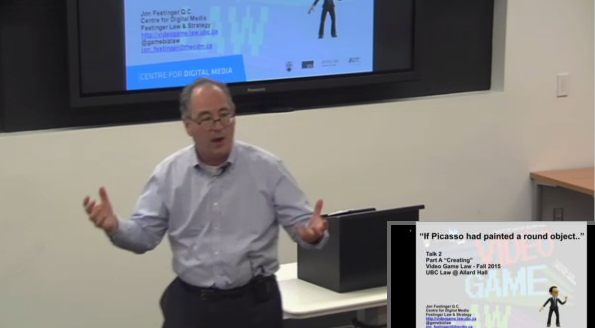
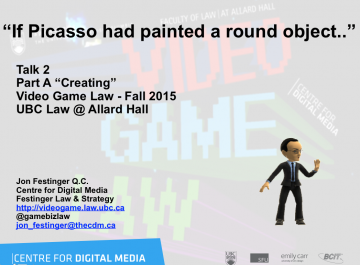
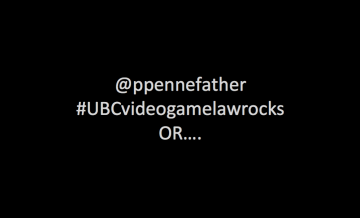
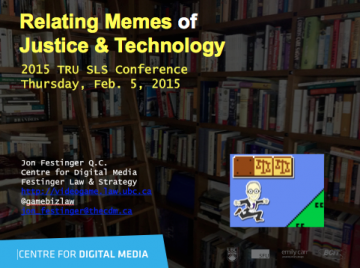
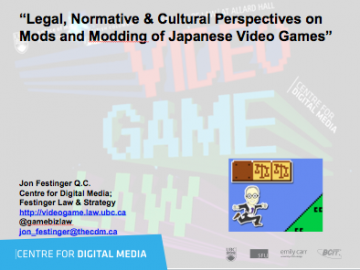
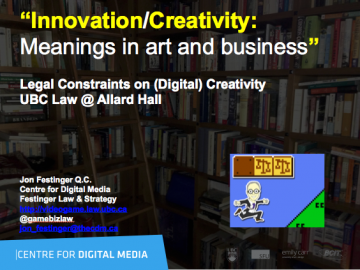
 Communications Law
Communications Law